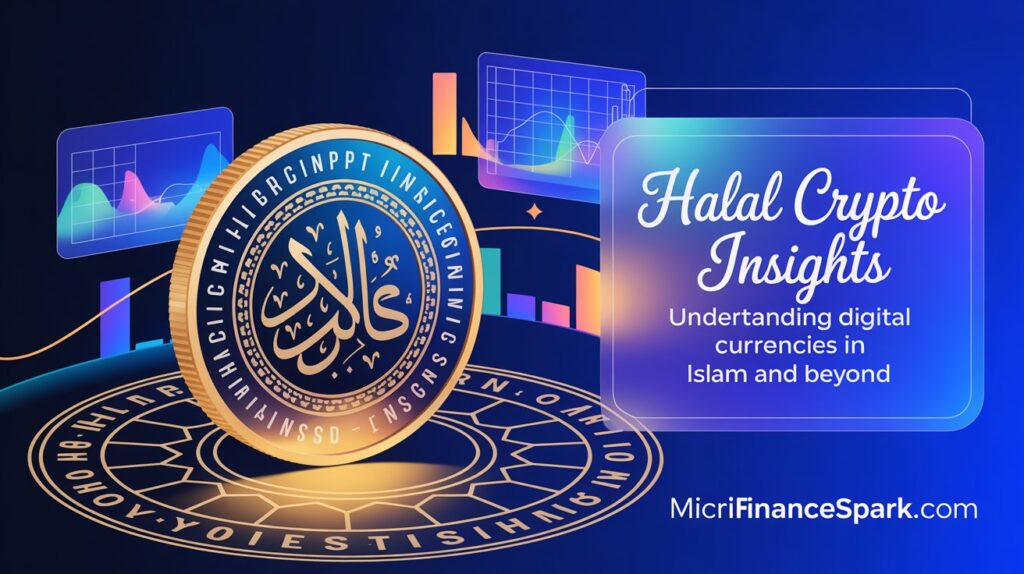Is cryptocurrency halal or haram? That question is stirring intense debate across Muslim communities and financial experts worldwide.
In this article, we’ll break down halal crypto insights, diving deep into Islamic finance principles, the rise of digital currencies, and how they intersect.
If you’re curious about the Shariah-compliance of Bitcoin, Ethereum, or even Islamic crypto tokens, you’re in the right place.
Halal Crypto List — Your 2025 Guide to Shariah-Compliant Digital Assets
Looking to invest without compromising your faith? A growing number of Muslims are turning to Shariah-compliant digital assets as crypto becomes more mainstream. This halal crypto insights list for 2025 brings you clarity in a space full of uncertainty.
Whether you’re new to cryptocurrency or a seasoned investor, this guide simplifies what’s permissible (halal) and what’s not — according to Islamic finance.
Must Read: Is Bitcoin Halal? Understanding Cryptocurrency in Light of Islamic Finance
Why a Halal Crypto List Matters in 2025
In 2025, Muslims represent over 1.9 billion people — many of whom are financially active and tech-savvy. As crypto adoption explodes globally, the need for a verified halal crypto insights list isn’t just important — it’s essential.
Without clear guidance, Muslims risk investing in haram or doubtful (shubhah) assets unknowingly. That’s where this list bridges the gap between modern finance and ethical Islamic investing.
Top Halal Cryptocurrencies in 2025 | What to Look For
Not every coin passes the Shariah screening test. Here’s what to look for when identifying top halal cryptocurrencies in 2025:
- No involvement in interest-based lending (riba)
- Project must offer real-world utility (not pure speculation)
- Transparent leadership and ethical governance
- Decentralization prevents fraud or manipulation.
- Free from impulses or intents toward pornography and gambling or any other illegal areas.
Coins that meet these standards earn a place in our halal digital asset list.
Our Ethical Investment Screening Process
We don’t just guess — we screen. Every token goes through a 3-layer Shariah compliance filter:
- Purpose Check – Is the project’s objective halal?
- Revenue Check – Are earnings free from haram activities?
- Operation Check – Does the team follow ethical practices?
Our process is reviewed by experts in Islamic finance and updated as the industry evolves.
Best Halal Coins to Invest in Dubai | The 2025 Outlook
Dubai is rapidly becoming a halal crypto insights hub, thanks to clear regulations and fintech-friendly laws. If you’re looking to invest from the UAE, these coins are showing strong Shariah-compliant potential:
- Islamic Coin (ISLM) – Built from the ground up on Shariah principles
- XDC Network – Backed by trade finance, with clean revenue sources
- Stellar (XLM): Not so much speculation but more so for cross-border remittances
- Transparent, fast, and focused on governance; Algorand (ALGO) ✔ Stellar (XLM)
These are among the best halal coins for Muslim investors in Dubai — combining ethics, performance, and legitimacy.
Recommended Halal Crypto Coins for 2025
Here’s a snapshot of Shariah-compliant coins worth watching:
| Coin Name | Symbol | Why It’s Halal |
| Islamic Coin | ISLM | Purpose-built for the Muslim community |
| Stellar | XLM | Enables ethical cross-border payments |
| Algorand | ALGO | Strong governance & utility-based use |
| XDC Network | XDC | Trade finance with no haram exposure |
| Tezos | XTZ | Clean staking and ethical ecosystem |
Always remember: screen before you invest. Markets move fast, but your ethics should stay firm.
Halal Cryptocurrency List
Here’s the latest halal crypto insights list vetted through Shariah-compliance lenses:
- ✅ Islamic Coin (ISLM)
- ✅ Stellar (XLM)
- ✅ Algorand (ALGO)
- ✅ XDC Network (XDC)
- ✅ Tezos (XTZ)
- ✅ Cardano (ADA)*
- ✅ Avalanche (AVAX)*
Some scholars recommend case-by-case analysis due to project complexity.
Coins Screened for Shariah Compliance
All listed coins undergo evaluation for:
- Business nature and income streams
- Transparency of tokenomics
- Speculative or riba-based operations
- Utility vs. gambling/synthetic yield
Coins that fail on any of these are removed or flagged.
Halal Coins
Coins considered halal crypto insights often meet these criteria:
- They solve real-world problems
- Don’t earn from prohibited sources
- Operate transparently under ethical models
- Are asset-backed or tied to utility, not just hype
These are safe grounds for Islamic investors.
Haram Coins or TBD
Some halal crypto insights projects are clearly haram due to:
- Involvement in gambling, pornography, or speculation
- Use of interest-bearing lending platforms
- Anonymous founders or scam-like practices
Examples often cited:
- ❌ Shiba Inu (SHIB) – Speculative meme coin
- ❌ SafeMoon – Poor tokenomics & transparency
- ❌ Luna Classic – High-risk, collapsed structure
Many others are marked TBD (To Be Determined) — waiting for more clarity or Shariah verdicts.
Halal Crypto List 2025: Updated 2nd July
It’s difficult to maintain Shariah compliance in the rapidly evolving world of digital currency. This is the reason we have put together this halal crypto insights List 2025, which has been carefully examined from a religious perspective.
Up until July 2nd, these coins can only be considered Sharia compliant if they meet all the conditions of Islamic economics concerning transparency, functionality, and ethicality.
This halal crypto insights list helps you check if your crypto portfolio aligns with your values, whether you are a tech-savvy Muslim entrepreneur or a cautious investor.
Shariah Screening for Halal Crypto
Shariah screening is a multi-layered process that evaluates crypto assets based on Islamic law. It includes:
- The project’s core objective
- Revenue sources and business operations
- Financial openness along with avoidance of riba.
- Absence of haram industries such as gambling, alcohol, pornography, etc.
It passes only if a coin conforms with the principles of ethical investment and fiqh.
What Qualifies a Crypto as Haram or Halal?
On the other hand, a cryptocurrency is haram if it:
- It supports ethical, productive use-cases
- Riba, fraud, and excessive speculation (gharar) are not part of its model.
- It isn’t utilized for haram services like gambling or drug use.
Conversely, a crypto becomes haram if it:
- Exists purely for speculation
- Operates anonymously with no governance
- Derives income from unethical sources
Are all Cryptocurrencies Halal?
No. Not all cryptos are halal by default.
In their considerment, cryptocurrencies, including Bitcoin and Ethereum, are often deemed Shariah-neutral, according to the purpose of their usage.
However, gambling and DeFi coins, meme coins, and privacy coins fall under the category of haram or doubtful (mashbooh)-being haram or doubtful (mashbooh).
Types of cryptocurrencies and how they are used or intended in practice are quite often considered Shariah-neutral, such as Bitcoin and Ethereum.
Project-by-project verification of shariah compliance is required.
Is Crypto Lending Halal?
Most halal crypto insights lending protocols mimic interest-bearing models, which are not permissible in Islam.
Yield farming, staking with interest, or earning from debt-based tokens generally involve riba, rendering them haram.
Some newer Islamic finance-based DeFi projects claim to offer profit-sharing models instead of interest, but these require strict scrutiny.
Gambling and Uncertainty in Islam
These practices promote unfair gains and harm, which go against the principles of justice and transparency in Shariah law.
That’s why speculative halal crypto insights assets that mimic these traits are often considered haram.
Speculative, extremely volatile tokens frequently imitate gambling activities.
Examples include pump-and-dump schemes, meme coins with no utility, or NFT lotteries.
Muslim investors must avoid any asset that functions as a game of chance.
Do You Have to Pay Zakat on Crypto?
The standard zakat rate is 2.5% of the crypto’s value, calculated annually based on the lunar calendar. Make sure to track market prices and use a trusted zakat calculator to stay accurate.
Zakat is typically 2.5% of the crypto’s market value held for over a lunar year. Traders and holders should track values using platforms like CoinMarketCap and use a Zakat calculator to stay accurate.
Halal Crypto Reports
Multiple Islamic scholars and organizations now issue halal crypto Reports. These include:
- Amanie Advisors
- Shariyah Review Bureau
- Finterra
- IFN Fintech
Such reports offer in-depth analysis on each token’s business model, operations, and potential conflicts with Shariah law.
Halal Coins – Top 50 List | Coinranking
Based on publicly available screenings, here are some consistently listed coins:
- Islamic Coin (ISLM)
- Stellar (XLM)
- Algorand (ALGO)
- Tezos (XTZ)
- Cardano (ADA)
- Avalanche (AVAX)
- XDC Network (XDC)
- Polygon (MATIC)
Note: Please stay updated with the most recent documents and Shariah reports, as project ethics and market behavior can change unpredictably at any time. Regular screening ensures your investments remain compliant.
Halal Crypto Investment Opportunities And Ways In Islam And Beyond
Islam encourages ethical investment in assets that create value. Halal crypto investing aligns with this by choosing projects that:
- Provide decentralized financial access
- Encourage transparent governance
- Serve humanitarian or economic development goals
Some Muslim investors are expanding their halal portfolios by exploring innovative blockchain-based assets.
Tokenized sukuk are digital versions of Islamic bonds, offering Shariah-compliant returns through asset-backed investments.
Islamic NFTs represent ownership in permissible digital content like art, education, or charity projects.
Must Read: Halal Crypto Insights — Understanding Digital Currencies in Islam and Beyond
FAQ’S
Can I trade crypto daily and still be halal?
If trades don’t involve haram assets or manipulation, short-term trading may be halal.
Is staking always haram?
Not always. It depends on whether rewards are interest-based or profit-sharing.
Can I use Bitcoin to pay zakat?
Yes, but value must be equivalent to fiat. Always check the market rate.
Are NFTs haram?
If they represent art, education, or utility — not gambling — they may be halal.
Is holding crypto better than trading in Islam?
Long-term investment is often preferred as it reduces excessive speculation.
Conclusion
In 2025, for one to navigate Halal investment in Cryptocurrency, one would have to develop financial literacy and Islamic consciousness. Not every digital asset is the same: some are definitely Halal; some are plainly not; and many land somewhere in between.
Muslim investors can embrace innovation while ardently observing their faith by referring to the Shariah-based crypto screening, as well as ethical tools and professional reports. Be informed, invest wisely, and always cross-check.

Maria Jolly is an experienced blogger at Micro Finance Spark, passionate about simplifying finance for everyday readers. With a sharp eye on trends in crypto, markets, budgeting, and smart saving, Maria delivers insightful, easy-to-understand content to empower informed financial decisions.






